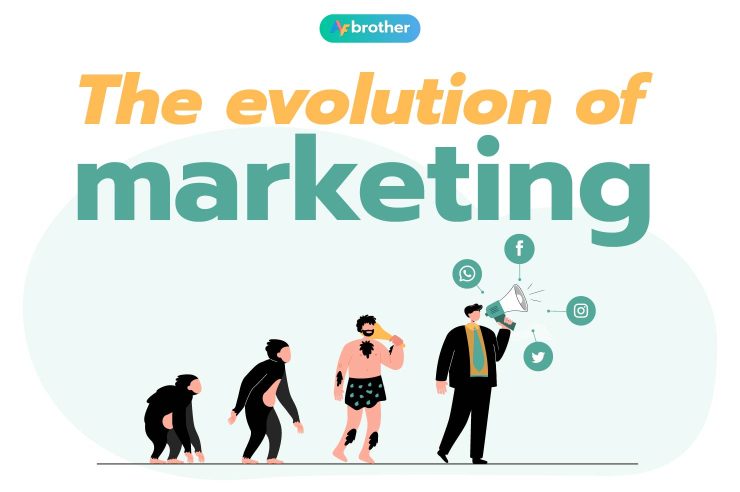Marketing is the process of creating, promoting, and dispersing goods and services while recognizing, predicting, and meeting the needs and wants of customers. It entails determining how to contact and engage target customers, devising a marketing strategy to do so, and assessing the success of those efforts.
Marketing is important because it enables companies to increase customer awareness and trust, produce leads and sales, and ultimately increase revenue. Businesses can develop goods and services that satisfy the needs of their target customers while setting themselves apart from rivals by recognizing these needs and desires. A strong brand identity and long-lasting relationships with customers are two more benefits of effective marketing for firms, both of which can promote client loyalty and repeat business.
-
8 Evolution of Marketing
1. Traditional Marketing
– Traditional marketing refers to the conventional methods of marketing that existed before the advent of digital technology. This includes traditional advertising channels such as print ads, TV commercials, radio ads, billboards, and direct mail. Traditional marketing relied heavily on mass media and mass communication, with limited targeting and personalization.
2. Digital Marketing
– The rise of the internet and digital technology revolutionized the marketing landscape. Digital marketing encompasses various online channels such as websites, search engines, social media, email marketing, content marketing, and mobile marketing. Digital marketing allows for more precise targeting, personalized messaging, and measurable results. It also enables brands to engage with consumers in real-time, gather data, and optimize campaigns for better performance.
3. Content Marketing
– Content marketing emerged as a significant trend in marketing, focusing on creating valuable and relevant content to attract and engage target audiences. Content can include blog posts, articles, videos, infographics, social media posts, and more. Content marketing aims to build brand authority, establish trust, and provide value to consumers rather than relying solely on promotional messaging.
4. Social Media Marketing
– Social media platforms gained tremendous popularity, creating new opportunities for brands to connect with their audiences. Social media marketing involves using platforms like Facebook, Instagram, Twitter, LinkedIn, and YouTube to promote products, engage with customers, and build brand awareness. Social media marketing allows for targeted messaging, real-time engagement, and user-generated content, which can drive brand advocacy and loyalty.
5. Influencer Marketing
– Influencer marketing has become a prominent trend in recent years, leveraging the popularity and influence of social media influencers to promote products or services. Influencer marketing involves partnering with influencers who have a significant following and credibility in a particular niche to promote a brand’s offerings. It allows for authentic and relatable brand endorsements, targeted reach, and potential for viral content.
6. Data-Driven Marketing
– With the proliferation of digital technology, data has become a crucial asset in marketing. Data-driven marketing involves using data and analytics to make informed decisions, optimize campaigns, and measure results. It includes tracking and analyzing data from various sources, such as website analytics, social media metrics, customer data, and market research, to gain insights into consumer behavior, preferences, and trends.
7. Personalization and Customer Experience
– In today’s marketing landscape, personalization and customer experience have become paramount. Brands are focusing on delivering personalized and relevant messaging, offers, and experiences to their customers. This includes using data and technology to segment audiences, tailor content, and provide personalized recommendations or offers. Customer experience has become a key differentiator, and brands are investing in creating seamless and engaging experiences across all touchpoints.
8. Integrated Marketing
– The evolution of marketing has also led to a shift towards integrated marketing, where brands strive for a cohesive and consistent approach across various channels and touchpoints. Integrated marketing involves aligning messaging, branding, and strategies across different marketing channels, including online and offline, to create a seamless and unified brand experience for consumers.
In conclusion, advances in technology, consumer behavior, and company dynamics have all contributed to the tremendous evolution of marketing over time. The marketing landscape has changed from traditional marketing to digital marketing, content marketing, social media marketing, influencer marketing, data-driven marketing, personalization, and integrated marketing. Marketers must constantly adapt to stay current and successful in attracting and retaining their target audiences.
AFbrother intended to be a revenue-generating hub for influencers and brands/marketers. We have compiled a long list of influencers both micro-influencers and superstars. All AFbrother participants with followers can easily earn through various campaigns.
Please follow AFbrother for more informations !!
AFbrother Website: https://afbrother.com/
AFbrother Twitter: https://twitter.com/AFBrotherGlobal
AFbrother Facebook: https://www.facebook.com/AFBrotherGlobal
AFbrother Youtube: https://www.youtube.com/channel/UC3jBh06fWzFfJIilW63NmWg




Comments (No)